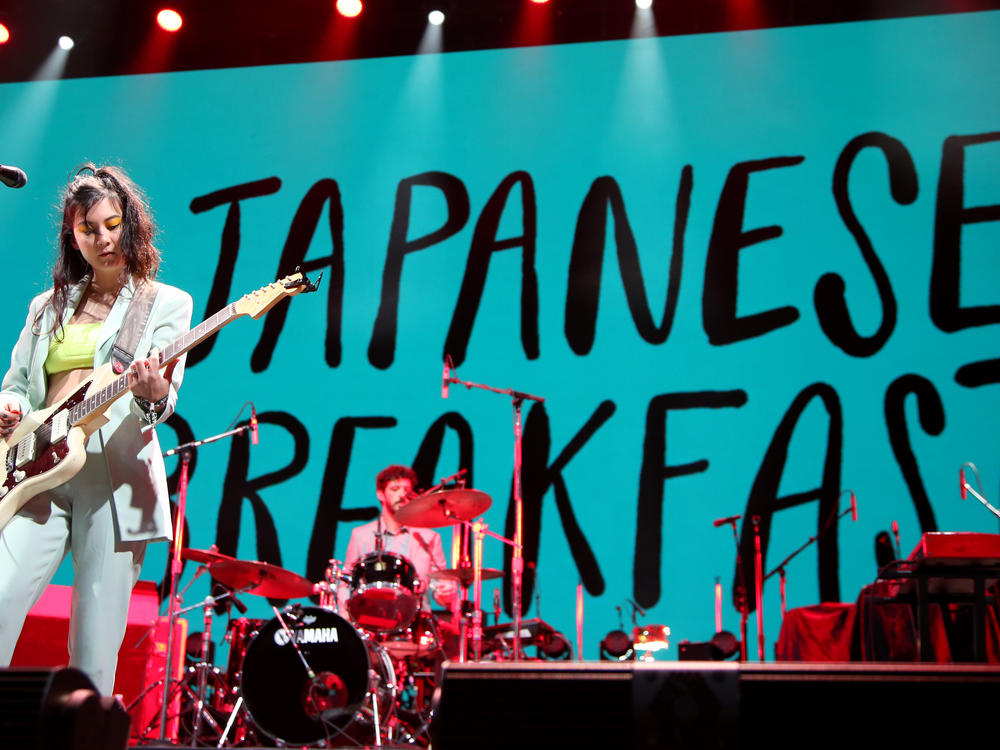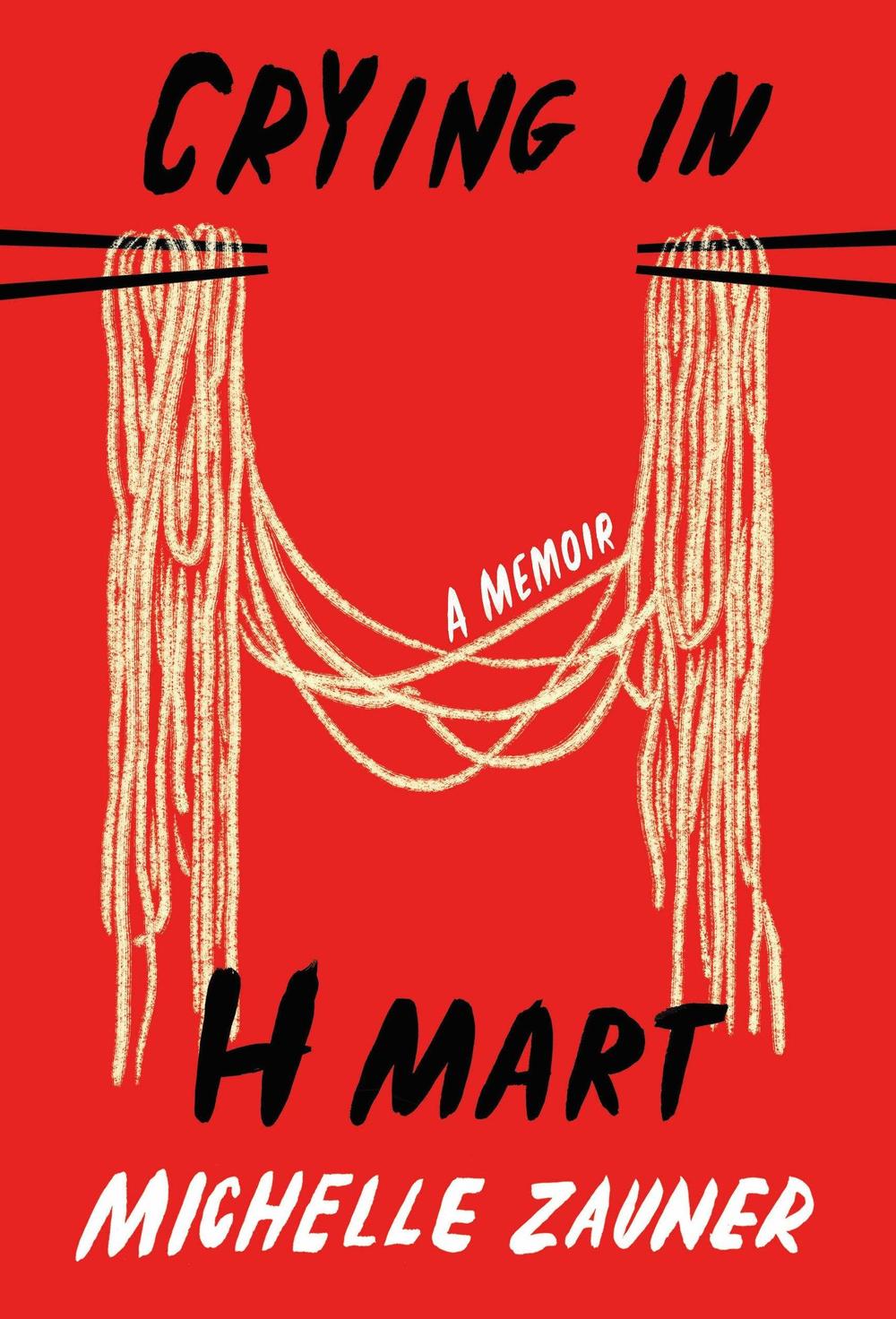Section Branding
Header Content
You Are What You Cook
Primary Content
Here on Code Switch, we're a little bit obsessed with books. We've explored books that taught us about a new dimension of freedom, books that are getting us through the pandemic, books that reminded us that the world is full of love. Today on the blog, producer Alyssa Jeong Perry is digging into a book that helped her understand new facets of her own identity: Crying in H Mart, by Michelle Zauner.
Many people are familiar with the phrase "eating your feelings." But in her new book, Crying in H Mart, author and musician Michelle Zauner explores what it means to cook your feelings. In the book, she uses the lens of food and cooking to explore her Korean identity after she loses her mother to cancer. For Zauner, whose mother is Korean and father is white, recreating family recipes became one of the ways she was best able to connect to her mother after her death.
Reading this book hit close to home for me. I lost my dad in my twenties after a decades-long battle with heart failure. As a transracial adoptee, I found myself lost and wondering who I was after he passed. So, about seven months after his death, I packed everything up and moved to Korea, where I was born. I spent that time searching for an identity that I felt I desperately needed to understand. Like Zauner, Korean food became a lens into my identity as part of the Korean diaspora. I didn't need language to understand that each dish I ate had a distinct story behind it.
Zauner and I sat down to talk about food, grief, and the different dimensions of our Koreanness. Our conversation has been edited for length and clarity.
When your mom passed away in 2014, you started looking more into your Korean side. I'm wondering, growing up, how did you define your Koreanness?
I think growing up, I didn't ever attempt to define my Koreanness. It was just this intrinsic part of me. It wasn't until my mom passed away that I sort of began to question if it belonged to me at all. And I realized that if it was something that I wanted to feel like really belonged to me, I was going to have to start putting work in to preserve it.
If there's one thing we all know about Koreans, it's that we love our food and we're very proud of it, and we show a lot of love through our food. You write in the first few pages of your book that food was how your mom expressed her love. Can you explain what that looked like to you?
Every time my mom and I would travel to Korea, the first thing weeks in advance, my aunt would ask my mom was, "Where are all the places that you want to eat?" So much time was spent making sure we hit up all these different restaurants and got the different types of food that she wanted to eat. It just takes a lot of time and consideration.
And I remember that same kind of love being expressed to me when I would return home from college. My mom would make sure to stock the fridge with all my favorite side dishes, my favorite kimchi, and make sure that they sat out on the counter in advance so they were perfectly soured. She would have a running list of all the places that we'd have to go to eat the things that I loved. She remembered if I liked extra broth in my stew or if I liked extra noodles or extra vegetables.
You mentioned Maangchi, a Korean chef who became popular on YouTube, a couple of times in the book. You write that those videos were how you learned to cook Korean food right after your mom died. When you were cooking with Maangchi online, could you walk me through what her videos did for you?
I found myself smiling for the first time watching this very cute, effervescent, Korean woman explain to me how to take off the little ends of the pine nuts and put them in a dish. It was just a really nice moment. When I found myself craving other dishes, I found myself turning to this woman over and over again. She sort of demystified this Korean cooking process that had scared me. The little things would really move me very deeply and remind me of my mom, from the way that she peeled a pear in a very Korean way by peeling one strip with a giant knife pulled towards her. My mom would always peel fruit this way. Also, the way that she pronounces zucchini really reminded me of my mom. It was just a really pleasant thing to anchor me during this really difficult time.
Do you ever find yourself becoming overwhelmed with emotions or crying while cooking Korean food, since it reminds you of your mom?
I think the thing that made me so sad after my mom passed away was that I could not remember her before she was sick. I moved out of the house when I was 18; I went to college at Bryn Mawr, three thousand miles away from Oregon. So the last concentrated period of time I spent with my family were the six months that I lived in Eugene, Ore., being a caretaker for her.
It made me so sad, because I was having all these dreams of my mother. I would always see her bald and skinny with a chemo port in her chest. I would just have a lot of trauma from caretaking for her. I think that was a big reason why I turned to cooking — and why Maangchi brought me so much joy. I was able to remember these memories of my mom before that happened, and things that we actually really enjoyed together. It made it a lot easier for me to to think about my mother without it being this horrifying, traumatic thing.
Both your music and your book explore a lot of what it's like to be biracial. What was it like for you growing up with a Korean mother and a white father?
When I'm in America, everyone thinks of me as the Asian girl. When I go to Korea, everyone thinks of me as an American. There's this expectation all the time that I just have never really fit in anywhere. Growing up, there were stereotypes being put onto me as an Asian person that I had no control over, and that made me extremely uncomfortable. But when I told my mom this, she was like, "But you're not Asian."
I was like, "Mom, you don't understand it is to be like one of the only Asian kids at my school. I'm like the only Korean girl at my school and it's uncomfortable." She just said to me, "You're not Korean, you're American."
It's hard to explain to your parents this feeling of being other and of being singled out. In a way, I had to make space for myself because no one's going to question, "Where are you from?" when you're in a rock band on a stage. People have paid to come see you. It's like, This is where I'm from, b****!
Copyright 2021 NPR. To see more, visit https://www.npr.org.


